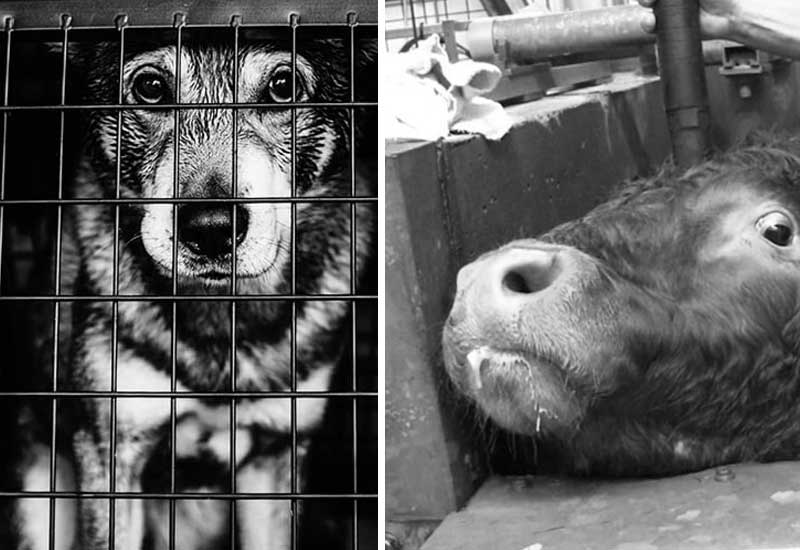What is meant by inconsistent behavior? And do you also know things that nobody actually wants, but they are still supported or encouraged by most people? Our actions have consequences. Mercy, pity, charity, kindness, tolerance, helpfulness – we describe human action with these positive character traits. But if we deviate from these values for a variety of reasons, inconsistent and ultimately inconsistent action can also have serious consequences – both for ourselves, and above all for third parties.

In this, admittedly unusual article, I would now like to introduce you to examples of inconsistent and contradictory behaviors that most people in our society consciously or unconsciously show. You can find out why this is so and how you can reconcile your thinking and acting. Here we go!
You can find a brief overview here in advance:
- Animal cruelty
- Child labor
- Global hunger
- Rainforest disorder
- racism
- Bee death
- Downtown die
- Escape
- Diseases
- Uncertain future of children & grandchildren
What exactly is inconsistent behavior?
Before we go to the examples, I would like to briefly explain the concept of inconsistency. It stands for inconsistency and contradiction. Inconsistent behavior is the contradiction between the (inner or expressed) attitude and the actual actions of a person.
Based on the following examples, you will quickly recognize that thinking and acting often simply do not harmonically harmonize with each other. Logical consistency is missing. The bad feeling that this often triggers inner conflict is referred to as cognitive dissonance.
What is the difference between inconsistency and inconsistency? Inconsistency is the state of contradiction between two things, inconsistency is the poor, illogical reaction to it.
10 examples: things that nobody actually wants, but (almost) everyone supports
You may think that you always rationally and consistently ration – and that your personal values match your everyday behavior exactly. But there is also a guaranteed in your life one or the other habit that entails it, against which you actually take with every fiber of your body. Yes, maybe even things that you really durably.
Here are the promised examples of contradictory behaviors that most people pursue – whether they want and know themselves or not.
1. “I am against cruelty to animals and animal suffering.”
Most of us would probably say that they are against cruelty to animals with bodies and souls. We would be injured, abused animals (whether dogs, cats, chickens, or cows) immediately help when we notice – and show people who apply violence, torture, and kill them.

But for some reason, we put on the blinders in our own diet. For example, pigs are driven alive into the slaughterhouse and then come out as a packed bacon cube – and we believe that something “human” happened in the walls. But human battles are an illusion-the “most animal-friendly” killing method is CO2 gasification, in which the animals are died or anesthetized under stinging pain. Whether pigs, chicks, calves, or lambs – there is simply no human way of taking life for a living being.
That is why it is inconsistent behavior to be against cruelty to animals, but at the same time pay money for someone behind closed doors to torture animals to produce animal food. “Bio meat” and “pasture milk” do not change anything. The only logical consequence in order to reconcile one’s own thinking and acting in this regard is no longer consuming animal products and living vegan.
2. “I am against child labor.”
Whether coffee, cocoa, palm oil, clothing, electronics, tobacco, leather, or gold – child labor is unfortunately the common best part of many industries. Unicef, the United Nations Children’s Aid, defines child labor on its own website as follows:
“Working for children who are too young or who are dangerous or exploitative, damage to physical or mental development or prevent the children from attending school. Children’s work deprives children of their childhood and violates the world’s rights that are valid worldwide. ”
Each of us would probably say that he is against the exploitation of children and vehemently dismisses every reproach that indicates the opposite.
But even if child labor is both the cause and the consequence of poverty and armed conflicts, climate change, as well as urbanization it promotes: we consumers are complicit! On the one hand, we people in western industrialized nations tend to excessively cheap goods consumption, which are produced in an outsourced manner in low-wage countries without occupational safety standards. But on the other hand, also because we are essential drivers of global warming.
How can child labor stop and prevent? Be sure to pay attention to the Fairtrade seal during your purchases-it stands for fairly grown and traded products, with transparent supply chains. The GOTS and IVN textile seals are important information when buying clothes. Prefer Fairtrade chocolate, use technical devices as long as possible, and do not follow everyone, new trend! Design your life more climate-friendly. And if possible, also support organizations such as Unicef, which are active against child labor every day.
3. “I don’t want people to go hungry.”
As a child, you learn early on that you should appreciate your meals because there are people in the world who have to fight for every bit. According to Welthungerhilfe, 828 million people worldwide – and every thirteen seconds a child dies under the age of five because it does not have enough to eat on the plate .₁
Nobody wants that – but nobody should be surprised that this can still happen in our times! Because it speaks for inconsistent behavior that around 931 million tons of edible foods are thrown away worldwide and that we get 56 billion farm animals every year, but not 8 billion people.
Our western, lavish way of life with preferred animal foods such as meat, milk, cheese, or eggs contributes to this distribution problem. Climate change also ensures that the harvests or livelihoods of people are particularly destroyed who contribute to the least.
If we want to stop world hunger, we have to rethink as a consumer. By planning our meals, sticking to the shopping list, processing remains for smoothies, and freezing excess meals, we can reduce our own food waste, for example. And a conscious, vegan diet helps us to be consumed directly by us instead of growing them as animal feed for factory farming and then eating the animals and their excretions (eggs, milk products & Co).
4. “I don’t want the rainforest to disappear.”
We all love tropical rainforests, don’t we? The unique, evergreen lungs of the earth are home to over 2 million animal and plant species. Nevertheless, over 400,000 square kilometers in the Amazon area have been cleared since 1990 – an area as large as Denmark and Germany.

The cause of the deforestation of the forests is primarily economic interests. At least for 70 percent of the cleared areas, the creation of pasture areas and the cultivation of animal feed is responsible for factory farming.
What can you do to save the rainforests and stop the contradictions in your own actions? A purely vegetable diet is preferred to make the step with which you can make an extremely big difference overnight. In addition, I advise you to do without palm oil products. With the Codecheck app, you can quickly identify them using a barcode scan.
5. “I’m not racist.”
Racism is a way of thinking and acting that assumes that there are different races of people and that people with certain biological characteristics are less worthy. For example, because of their origin, their hair, their name, their language, or their skin color, they are discriminated against, devalued, and excluded.
Hardly anyone would claim to be a racist or right-wing extremist. But in addition to open, hateful, racist insults, there are also more subtle forms of racism, which many of us occasionally lead to a racist statement – usually only at a second glance. The so-called everyday racism is rather inconspicuous – for those affected, for example, the following, casual statements, but anything but quickly forgets:
- “Where do you come from (really)?”
- “But you can do it!”
- “We’re not with the Hottentots here.”
- “May I touch your hair?”
- “You are exotic!”
- …
Such questions and sentences suggest that someone is unusual, different, or perhaps even strange. To combat racism, we have to learn to adapt our choice of words. This may not change social framework conditions, but it prevents existing racism from constantly reproducing again.
6. “I don’t want the bee to disappear.”
The bee is the ambassador of biodiversity and on the popularity scale in the animal world at a really high altitude. Also because as a pollinator of plants, she plays a crucial role in global nutritional security. In the UK alone, around 80 percent of plants have to be stunned by the bee. What that has to do with inconsistent behavior? Most people would probably claim to be bee friends and protect the insects.
But the bee death is progressing – and the biggest driver is once again man. The dense development in the cities, monocultural agriculture, and the use of pesticides also create it.
If you want to protect the bee, you should make your garden bee-friendly. For example, rely on blossoming plants, such as thyme and lavender. Build up a bee hotel and provide insects with nesting aids. Avoid the use of pesticides and prefer organic food for your purchases that come from ecological agriculture without pesticide use.
Tip: The bee is not the only animal. You can find out how each of us can stop insect death in the linked contribution.
7. “I don’t want the small shops to disappear from the city centers.”
Under the terms “inner city death” or “shopping”, we all know the structural tasks in inpatient retail. The empty rooms and bare windows of former shops, which only adorn a few old brand stickers, are difficult to bear. There is hardly anyone who welcomes this picture-except maybe some e-commerce companies and a few online retailers. Because the steadily growing online trade is the main cause of dying the shops in the city centers.

Where is the inconsistency? Although consumers now see themselves as responsible most people continue to prefer comfortable online shopping-especially at Amazon. The share of the company in online individual sales was already 53 percent in 2020.
So if you are really interested in the fact that the inner cities remain as alive as possible or become again as soon as possible, you should prefer to shop on-site again and support the regional shops instead of the big players. One step, out of the grown habits, is necessary.
8. “I don’t want people to leave their homes.”
It would feel like Mies to be responsible for the fact that other people have to flee from their home country due to their own behavior. War and violence, human rights violations, hunger, environmental disasters, climate change … The list of causes of flight is long. Nobody welcomes the fact that people have to leave their belongings for a variety of reasons to flee. Some people even take demonstrations on the street because they do not want refugees.
As a rule, they are even to blame for the global, social problem that they do not want to have. For example, environmental refugees leave their country due to floods, droughts, harvest failures, or major fires. Scenarios are becoming more and more likely to occur in the future due to the climate-damaging behavior in our society.
Not every cause of the escape can be prevented – but at least we can specifically counteract the most sustainable lifestyle.
9. “I don’t want to get sick.”
Health is the most important thing in life, do you also find? This can particularly confirm the people who themselves had a serious illness or who have lost a loved one based on a disease. But of course, everyone strives to stay healthy. However, this striving is not always reflected in your own behavior.
“Health is not everything, but everything is nothing without health.”
(Arthur Schopenhauer (more under health quotes)
Stop smoking? Impossible! Become a vegan from meat eaters? No chance! More movement in everyday life? No time! It is difficult to imagine that it is the top goal for most to be healthy and stay long. Above all, nutritional diseases such as obesity, diabetes mellitus type 2, or high blood pressure could be prevented, for example by a vegetable diet.
If you really get old and want to live as long as possible, you should let smoking, drink a lot of water, go the precaution, often stay in nature, provide a lot of exercise and sleep – and last but not least, find tasks that fulfill you and inspire. Lay off your inconsistent behavior and enjoy a calming clarity in your life.
10. “I don’t want my children and grandchildren to grow up on an uninhabitable planet.”
Climate change, increasing natural disasters, wars for resources, water shortages, beaches full of plastic waste, poisoned rivers, dirty air … The environmental problems of our time are man-made – and therefore, at least in theory.

Now one could expect a jerk to go through our society and that we change our behavior in order to protect natural resources and preserve the planet for future generations. After all, who wants their own children and grandchildren to expect an uncertain future? Everyone would do everything possible for their offspring. But changing your own habits does not necessarily seem to belong.
If you do not want to live further at the expense of future generations or other people, you should therefore put an end to the exploitation of nature for your own way of life and learn to live more sustainably. To change to a green electricity provider, eating less meat, reducing your own plastic waste, traveling more environmentally conscious, and being more often on the move by aircraft and car would definitely be a good start.
End inconsistent behavior means reconciling speeches and act
I can imagine that you would support most of the things from this article – but also that you have so far kept yourself. Sometimes without knowing it, but maybe even, even though you know. Inconsistency is usually a result of our die-hard habits that want to be stored first. But no longer paying for things that you don’t want anyway should be a good motivation.
Fortunately, the demand determines the supply. We are able to adapt and make rational decisions, even if drastic changes are often difficult.
I very much hope that this little reality check has helped you. Did you discover internal conflicts or contradictions between your attitude and your actions? If so, it is your chance to end your possibly inconsistent behavior.
Do you have any questions, tips, or suggestions? Are there any things that you have supported unintentionally? I’m looking forward to your comment.
Stay consistent,















































